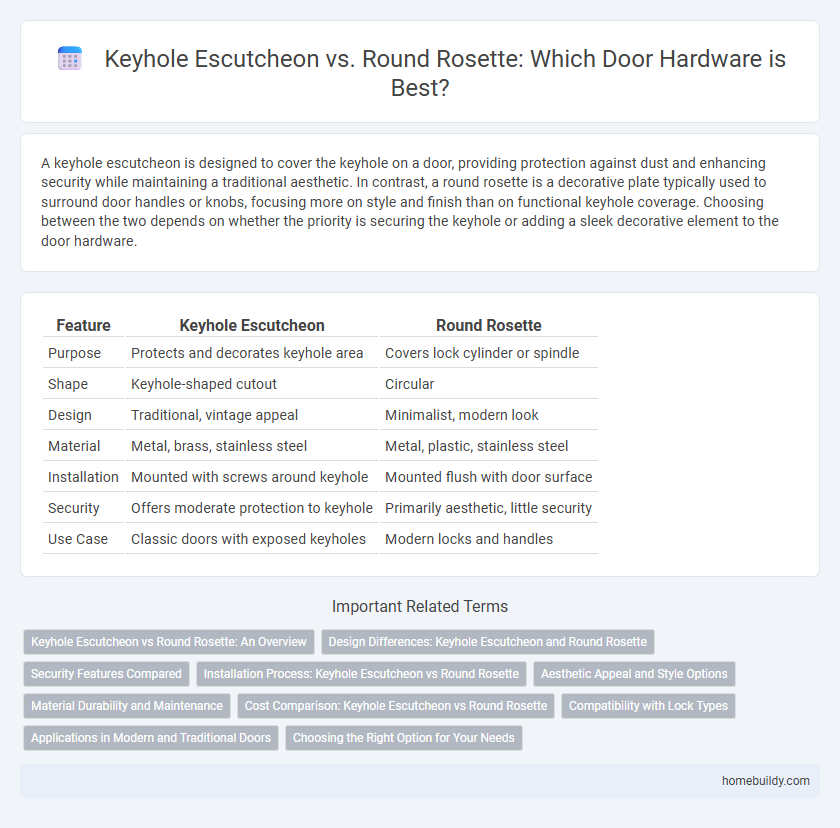A keyhole escutcheon is designed to cover the keyhole on a door, providing protection against dust and enhancing security while maintaining a traditional aesthetic. In contrast, a round rosette is a decorative plate typically used to surround door handles or knobs, focusing more on style and finish than on functional keyhole coverage. Choosing between the two depends on whether the priority is securing the keyhole or adding a sleek decorative element to the door hardware.
Table of Comparison
| Feature | Keyhole Escutcheon | Round Rosette |
|---|---|---|
| Purpose | Protects and decorates keyhole area | Covers lock cylinder or spindle |
| Shape | Keyhole-shaped cutout | Circular |
| Design | Traditional, vintage appeal | Minimalist, modern look |
| Material | Metal, brass, stainless steel | Metal, plastic, stainless steel |
| Installation | Mounted with screws around keyhole | Mounted flush with door surface |
| Security | Offers moderate protection to keyhole | Primarily aesthetic, little security |
| Use Case | Classic doors with exposed keyholes | Modern locks and handles |
Keyhole Escutcheon vs Round Rosette: An Overview
Keyhole escutcheons provide precise keyhole protection and enhanced aesthetic appeal for traditional locks, offering a focused design that complements classic door hardware. Round rosettes, by contrast, feature a broader, minimalistic shape designed to cover the lock cylinder or handle base, prioritizing versatility and modern style. Choosing between a keyhole escutcheon and round rosette depends on the door hardware style, security needs, and desired decorative impact.
Design Differences: Keyhole Escutcheon and Round Rosette
The keyhole escutcheon features an elongated oval shape designed to accommodate traditional keyholes, providing a vintage or classic aesthetic. In contrast, the round rosette presents a circular form, often used to frame modern door knobs or handles, emphasizing simplicity and minimalism. The keyhole escutcheon typically includes a functional key slot, whereas the round rosette serves primarily as a decorative plate without key access.
Security Features Compared
Keyhole escutcheons provide enhanced security by covering the keyhole, preventing tampering and unauthorized access, whereas round rosettes primarily offer aesthetic appeal with limited protective functionality. The design of keyhole escutcheons often includes reinforced materials and concealed lock mechanisms that resist picking and drilling attacks. In contrast, round rosettes lack such security features, making keyhole escutcheons a preferred choice for securing external doors and high-risk entry points.
Installation Process: Keyhole Escutcheon vs Round Rosette
Keyhole escutcheons require precise alignment with the lock mechanism, ensuring the keyhole fits snugly within the plate for seamless operation, often involving screws or adhesive backing. Round rosettes typically feature a simpler installation process with fewer components, often mounting directly over the lock cylinder using snap-on or threaded fittings. The keyhole escutcheon's installation demands more accuracy to maintain functionality, whereas round rosettes prioritize quick and straightforward attachment.
Aesthetic Appeal and Style Options
Keyhole escutcheons provide a vintage and functional aesthetic that enhances traditional and rustic interior designs, contrasting with round rosettes which suit modern and minimalist styles through their clean, symmetrical lines. The elongated shape of keyhole escutcheons adds visual interest and supports a range of decorative finishes such as antique brass and oil-rubbed bronze, offering versatile style customization. Round rosettes deliver a sleek, understated look with smooth contours, available in contemporary materials like brushed nickel and matte black, catering to streamlined and subtle design preferences.
Material Durability and Maintenance
Keyhole escutcheons are typically crafted from solid brass or stainless steel, ensuring superior material durability compared to round rosettes, which frequently use softer metals or alloys. The robust construction of keyhole escutcheons offers enhanced resistance to wear, corrosion, and environmental exposure, reducing the frequency of maintenance and replacement. Maintenance for keyhole escutcheons is straightforward, requiring only periodic cleaning and lubrication, whereas round rosettes may demand more frequent care to prevent tarnishing and structural degradation.
Cost Comparison: Keyhole Escutcheon vs Round Rosette
Keyhole escutcheons typically cost less than round rosettes due to simpler manufacturing processes and lower material usage. Round rosettes often involve more intricate designs, which increases production expenses and retail price. Choosing a keyhole escutcheon can offer an economical solution without compromising functional door protection and aesthetic appeal.
Compatibility with Lock Types
Keyhole escutcheons offer precise compatibility with traditional keyhole-shaped locks, providing a secure and tailored fit that enhances both function and aesthetics. Round rosettes, while versatile, primarily suit knob or lever handles and may not align seamlessly with keyhole locks, potentially compromising security and design coherence. Choosing between a keyhole escutcheon and a round rosette depends on the lock type, with the former being ideal for mortise locks and the latter best for tubular or cylindrical locks.
Applications in Modern and Traditional Doors
Keyhole escutcheons provide precise alignment for locks and enhance security on both modern and traditional doors, making them ideal for functional and decorative applications. Round rosettes, known for their sleek, minimal design, are often preferred in contemporary settings for aesthetic simplicity but may offer less protection around locking mechanisms. In restoration projects or heritage buildings, keyhole escutcheons maintain period-appropriate details while supporting robust locking systems, whereas round rosettes suit minimalist door hardware in modern interiors.
Choosing the Right Option for Your Needs
Keyhole escutcheons provide precise protection and a classic aesthetic for traditional door locks, while round rosettes offer a minimalist design ideal for modern interiors. When choosing between the two, consider the level of security, style preference, and compatibility with your existing hardware. Selecting the appropriate escutcheon enhances both the functionality and visual appeal of your door fittings.
Keyhole escutcheon vs Round rosette Infographic

 homebuildy.com
homebuildy.com